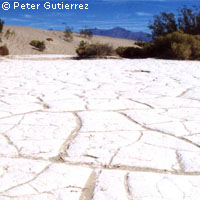IPCC Chief: 'We need a new ethic'
'What we really need is a new ethic, by which every human being realises the importance of the challenge we are facing and starts taking action to meet it effectively through changes in lifestyle, through changes in attitude and behaviour,' said Rajendra Pachauri, Chair of the Intergovernmental Panel on Climate Change (IPCC), at the release of the IPCC's fourth assessment report in Valencia, Spain. The new report highlights the fact that global warming could lead to some impacts which are abrupt or irreversible. These include the loss of ice sheets, and the resulting rise in sea levels; species extinction; and changes in ocean currents which will have knock-on effects for fisheries, oceanic carbon dioxide uptake and terrestrial vegetation. Even without the melting of the ice sheets, sea level rise due to the thermal expansion of the oceans alone is now inevitable, the report warns. 'This is an extremely serious finding, which clearly establishes that with our actions [...] we have already committed the world to experiencing sea level rise due to thermal expansion alone,' said Dr Pachauri, adding that if the melting of ice bodies is added to this, 'that clearly gives you a picture of the kinds of problems we are likely to face'. Extreme events, such as droughts and storms, are also addressed by the report, which states that the frequency of 'heavy precipitation events' has increased over most areas, while the area affected by drought has also increased. Dr Pachauri also emphasised that 'the impacts of climate change are not going to be felt uniformly'. In Africa, between 75 and 250 million people are projected to be exposed to increased water stress, and yields from rain-fed agriculture could be reduced by 50% in some areas. The situation also looks bleak in Asia, where freshwater availability is projected to decrease, while heavily populated coastal areas are likely to find themselves at increased risk of flooding. Meanwhile small island states around the world are threatened by flooding, storm surges, erosion and other coastal hazards. However, the report is not all doom and gloom. 'Fortunately, humanity has within its reach a number of solutions,' commented Dr Pachauri. These include policies and instruments which governments can put in place to create incentives for mitigation, and new technologies which are either currently available or likely to be commercialised in the coming decades. Of particular importance is setting an effective carbon-price signal. 'This is an important finding,' declared Dr Pachauri. 'If we want action, then clearly there has to be a price attached to carbon which will move us towards a low carbon economy.' UN Secretary-General Ban Ki-moon recently visited the Amazon and Antarctica to see the effects of climate change for himself. He praised the work of the IPCC, and described the latest report as 'succinct and user-friendly'. 'The message it contains could not be simpler,' he commented. 'The threat of climate change is real and there are concrete and affordable ways to deal with it.' The Secretary-General exhorted the world's governments to start work towards a new, comprehensive climate change deal when they meet in Bali, Indonesia, in December. 'The scientists have now done their work and I call on political leaders to do theirs and agree not only to launch negotiations, but also to conclude them by 2009,' he said. 'There is no time to waste.' This latest report is a synthesis of the three reports issued earlier this year which look at the scientific basis of climate change, its impact and ways to mitigate and adapt to it. Putting it together involved over 2,500 expert reviewers, 800 contributing authors and 450 lead authors from over 130 countries. Dr Pachauri underlined the report's unique nature, pointing out that it had to be accepted and approved by all the governments who are members of the IPCC.



